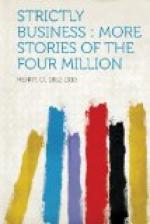“God in the mountains!” cried Greenbrier, holding fast to the foreleg of his cull. “Can this be Longhorn Merritt?”
The other man was—oh, look on Broadway any day for the pattern—business man—latest rolled-brim derby—good barber, business, digestion and tailor.
“Greenbrier Nye!” he exclaimed, grasping the hand that had smitten him. “My dear fellow! So glad to see you! How did you come to—oh, to be sure—the inaugural ceremonies—I remember you joined the Rough Riders. You must come and have luncheon with me, of course.”
Greenbrier pinned him sadly but firmly to the wall with a hand the size, shape and color of a McClellan saddle.
“Longy,” he said, in a melancholy voice that disturbed traffic, “what have they been doing to you? You act just like a citizen. They done made you into an inmate of the city directory. You never made no such Johnny Branch execration of yourself as that out on the Gila. ’Come and have lunching with me!’ You never defined grub by any such terms of reproach in them days.”
“I’ve been living in New York seven years,” said Merritt. “It’s been eight since we punched cows together in Old Man Garcia’s outfit. Well, let’s go to a cafe, anyhow. It sounds good to hear it called ‘grub’ again.”
They picked their way through the crowd to a hotel, and drifted, as by a natural law, to the bar.
“Speak up,” invited Greenbrier.
“A dry Martini,” said Merritt.
“Oh, Lord!” cried Greenbrier; “and yet me and you once saw the same pink Gila monsters crawling up the walls of the same hotel in Canon Diablo! A dry—but let that pass. Whiskey straight—and they’re on you.”
Merritt smiled, and paid.
They lunched in a small extension of the dining room that connected with the cafe. Merritt dexterously diverted his friend’s choice, that hovered over ham and eggs, to a puree of celery, a salmon cutlet, a partridge pie and a desirable salad.
“On the day,” said Greenbrier, grieved and thunderous, “when I can’t hold but one drink before eating when I meet a friend I ain’t seen in eight years at a 2 by 4 table in a thirty-cent town at 1 o’clock on the third day of the week, I want nine broncos to kick me forty times over a 640-acre section of land. Get them statistics?”
“Right, old man,” laughed Merritt. “Waiter, bring an absinthe frappe and—what’s yours, Greenbrier?”
“Whiskey straight,” mourned Nye. “Out of the neck of a bottle you used to take it, Longy—straight out of the neck of a bottle on a galloping pony—Arizona redeye, not this ab—oh, what’s the use? They’re on you.”
Merritt slipped the wine card under his glass.
“All right. I suppose you think I’m spoiled by the city. I’m as good a Westerner as you are, Greenbrier; but, somehow, I can’t make up my mind to go back out there. New York is comfortable—comfortable. I make a good living, and I live it. No more wet blankets and riding herd in snowstorms, and bacon and cold coffee, and blowouts once in six months for me. I reckon I’ll hang out here in the future. We’ll take in the theatre to-night, Greenbrier, and after that we’ll dine at—”




